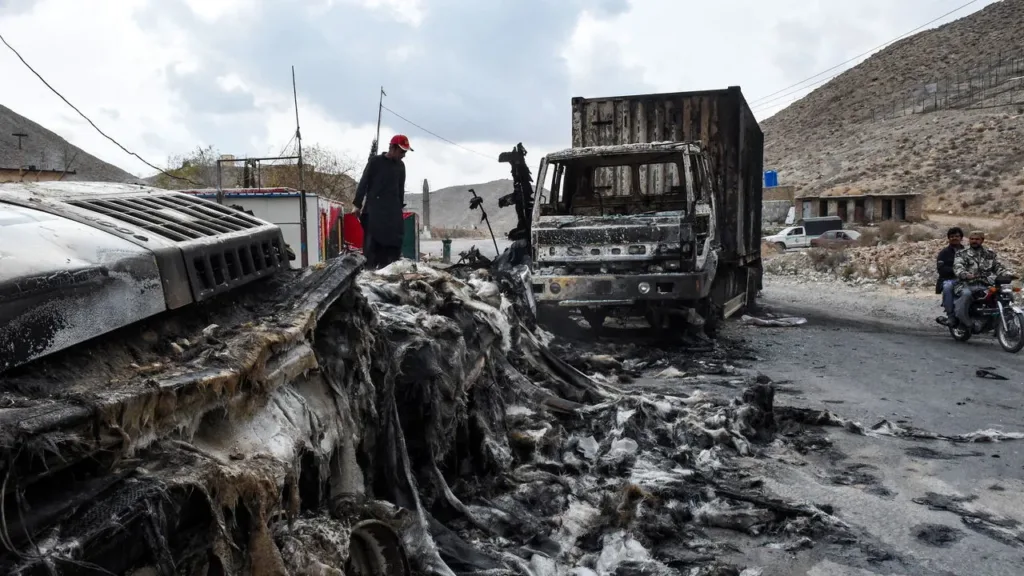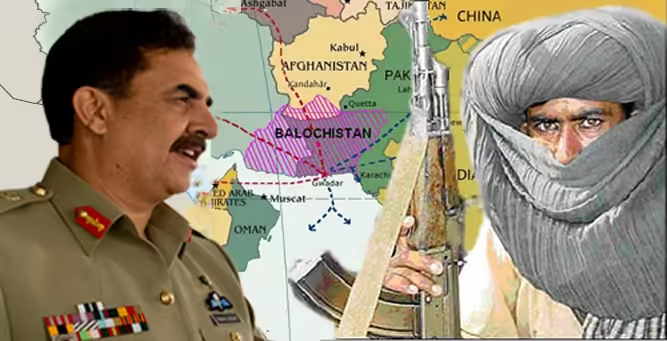Recent militant attacks in Balochistan, Pakistan, have resulted in the deaths of at least 38 people, marking a significant escalation in violence within the region. These assaults, attributed to the Balochistan Liberation Army (BLA), have targeted civilians and law enforcement personnel alike, raising concerns about the stability of the province and its implications for Pakistan’s broader security landscape.
Overview of the Attacks
The recent wave of violence included incidents where militants forced passengers from vehicles and executed them based on their ethnic backgrounds, primarily targeting individuals from Punjab and Khyber Pakhtunkhwa. In one particularly brutal attack, militants blocked a highway in Musakhel district, leading to the deaths of 23 individuals after they were identified through their national ID cards[2][5]. This pattern of violence reflects a strategic shift towards more indiscriminate attacks, contrasting with previous tactics that primarily focused on security forces.
Implications for Balochistan and Pakistan

Balochistan has long been a hotbed of insurgency, fueled by grievances over political marginalization and resource exploitation by the central government. The recent attacks underscore a growing insurgency that has gained traction among various ethnic groups in the province. Analysts suggest that the ongoing violence poses serious challenges for the Pakistani government, which has struggled to maintain control over the region. The BLA’s recent operations are seen as the most extensive offensive in years, indicating a potential resurgence of separatist sentiment.
The instability in Balochistan is compounded by the geopolitical context, particularly following the Taliban’s takeover of Afghanistan. This shift has emboldened Baloch separatist groups, as the porous border allows for the movement of militants and resources, further complicating Pakistan’s security situation. The influx of militants from Afghanistan has strained Pakistan’s military and intelligence capabilities, which are already stretched thin due to various domestic crises, including economic challenges and political unrest.
Regional Security Concerns

The implications of the Balochistan crisis extend beyond Pakistan’s borders. The region’s volatility could impact Pakistan’s focus on its longstanding conflict with India over Jammu and Kashmir. As Pakistan grapples with internal security issues, its ability to engage effectively in Kashmir may be compromised. Some experts argue that the increased instability in Balochistan could inadvertently create a window for peace negotiations in Kashmir, as Pakistan may seek to stabilize its internal situation before addressing external conflicts.
Government Response and External Influences
The Pakistani government’s response has included military operations aimed at countering the insurgency, but these efforts have often been met with limited success. The use of heavy-handed tactics has sometimes exacerbated local grievances, leading to further alienation of the Baloch population. Additionally, the involvement of external actors, particularly India, has been a point of contention, with Islamabad accusing New Delhi of supporting Baloch separatists.
China’s interests in the region, particularly through its Belt and Road Initiative (BRI), have also been affected by the deteriorating security situation. Recent attacks on Chinese nationals in Pakistan have prompted Beijing to demand increased security measures for its citizens, further straining Pakistan’s resources and complicating its international partnerships.
Future Outlook
The future of Balochistan remains uncertain as the province continues to grapple with insurgency, ethnic tensions, and external pressures. The potential for increased violence could lead to a cycle of retaliation between state forces and insurgents, further destabilizing the region. Experts warn that without a comprehensive political solution addressing the root causes of the conflict, Balochistan may continue to descend into chaos, with significant repercussions for Pakistan’s geopolitical standing and internal stability.
In conclusion, the recent militant attacks in Balochistan highlight the fragility of security in the region and pose serious challenges for Pakistan’s government. As the situation evolves, it will be crucial for Islamabad to navigate these complexities while seeking to restore stability and address the underlying issues fueling the insurgency.
More Interesting Articles
Hindus in Peril: Bangladesh Hindus Descends into Religious Violence After Political Upheaval
Kursk Region: Ukrainian Military Offensive Expands, Marking a New Phase in the Conflict
Tensions Ignite: Israeli Official Declares Iran War ‘Inevitable,’ Urges U.S. Preemptive Strike
Kursk Region Gains: Top Ukrainian Commander Reveals Major Territorial Advances
Former ISI Chief Faiz Hameed Arrested: Unprecedented Court-Martial Initiated
Iconic Statue Commemorating Pakistan Army’s 1971 Surrender Vandalized in Bangladesh
Rising Tides of Protest: Hindus in Bangladesh Demand Justice Amidst Escalating Violence
Hindenburg Research Under the Microscope: Uncovering Allegations of Bias and Destabilization
Top 10 Best Performing Equity-Oriented Mutual Funds in July 2024: Unmissable Winners and Stellar
CrowdStrike and Microsoft Disruption Sparks Global Chaos: A Major Incident Unfolds
European Union to Strongly Warn Elon Musk’s X for Failing to Combat Dangerous Content
Paramount Global to Merge with Skydance Media in a Game-Changing $28 Billion Deal
AI Ascendancy: Nvidia’s Market Cap Milestone Marks New Era of Tech Dominance
Microsoft’s Satya Nadella and BlackRock’s Larry Fink Lead Tech Titans at the G-7 Summit in Italy
Reliance Power Emerges Debt-Free: Anil Ambani’s Remarkable Turnaround
Decoding Warren Buffett’s Exit from Apple: Essential Lessons for Savvy Investors
Foreign-exchange reserves of India Reach Record High Under PM Modi’s Leadership
The Rise and Fall of Revenge Spending/ Shopping: Unmasking Post-Pandemic Consumer Behavior
NVIDIA Stock Announces Record Financial Results for Q4 and Fiscal 2024
Cryptocurrency Trading in India Faces Uncertain Times: SEBI’s Recommendations and RBI’s Concerns
Cooling Champions: The Top 10 Inverter Air Conditioners for Energy-Savvy Homes
Discover more from News 24 Media
Subscribe to get the latest posts sent to your email.


